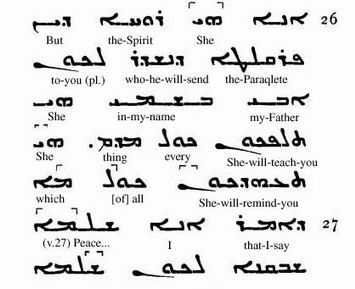No problem.

In Aramaic, nouns and adjectives are declined with endings based upon three parameters:
- Gender - Either Masculine or Feminine. There is no neuter, but there are "default" genders for certain groups of things.
- Number - Either Singular or Plural (and there are a few holdovers from an ancient "dual" but those are usually reserved for body parts that come in pairs).
- State - Either Absolute (or "indefinite"), Construct (used for compounds, think of it as "[word] of"), or Emphatic (think "definite"). In Eastern Aramaic dialects (like, say Classical Syriac or late Jewish Aramaic), the Emphatic has pretty much taken over as the default state for all words with the Absolute only used in phrases. In Western Aramaic dialects (like the Galilean that Jesus spoke) the Absolute/Emphatic distinction (i.e. indefiniteness vs definiteness) was preserved. Think of it as /ha-/ in Hebrew or /ho/ in Greek.
Let's take the adjective טב
/ṭāv/ which means "good" or "a good thing" and decline it over all of these permutations:
In the
Masculine: (
Singular -
Plural)
- Absolute: /ṭāv/ - /ṭāvin/
- Construct: /ṭāv/ - /ṭāve/
- Emphatic: /ṭāvā/ - /ṭāvayā/ (or /ṭāve/ in Eastern dialects)
In the
Feminine: (
Singular - Plural)
- Absolute: /ṭāvā/ - /ṭāvān/
- Construct: /ṭāvaṯ/ - /ṭāvāṯ/
- Emphatic: /ṭāvta/ - /ṭāvaṯa/
There are some exceptions where a word is
gramattically one gender (i.e. it takes on pronouns, verbs, and matching adjectives of one gender) but is
declined like the opposite gender (either in one number, or both).
Like our word /ruaḥ/ or "spirit". It is declined as a masculine noun, but takes on feminine adjectives, pronouns, and verbs.
Examples:
- /ruḥā ṭāvtā/ = "the good spirit"
- /ruḥin ṭāvān/ = "good spirits"
- /ruḥayā ṭāvaṯa/ = "the good spirits"
- etc.
/Ruaḥ/ is in the masculine emphatic form, but the adjective is in the feminine emphatic, because despite /ruaḥ/
looking masculine, it's a
feminine noun. If one were to use the masculine Emphatic adjective /ṭāv
ā/ paired with the Emphatic /ruḥā/ it would be improper grammatically... well-- that is until about the 7th century. Then that changed when the gender of /ruaḥ/ changed (and only when it referred to the Holy Spirit).

Does that help?


